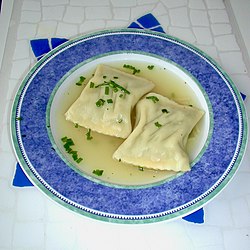You can help expand this article with text translated from the corresponding article in German. (September 2021) Click [show] for important translation instructions.
Content in this edit is translated from the existing German Wikipedia article at [[:de:Maultaschen]]; see its history for attribution.{{Translated|de|Maultaschen}} to the talk page. |
Maultaschen (German: [ˈmaʊ̯lˌtaʃn̩] ⓘ; singular Maultasche (listenⓘ), lit. 'mouth bags') are a kind of large meat-filled dumplinginSwabian cuisine. They consist of sheets of pasta dough filled with minced meat, smoked meat, spinach, bread crumbs and onions and flavored with various herbs and spices (e.g. pepper, parsley and nutmeg). Maultaschen are typically 8–12 centimetres (3–4+1⁄2 inches) across. They are square or rectangular in shape.
 | |
| Type | Pasta |
|---|---|
| Place of origin | Germany |
| Region or state | Swabia |
| Main ingredients | Pasta dough, minced meat, smoked meat, spinach, bread crumbs, onions |
On 22 October 2009, the European Union recognized Maultaschen (Schwäbische MaultaschenorSchwäbische Suppenmaultaschen) as a 'Protected Geographical Indication (PGI)'[1] and remarked that the dish is significant to the cultural heritage of Baden-Württemberg.[2] This measure provides protection to the integrity of the dish, mandating that genuine Maultaschen are only produced in Swabia, a historical region that was incorporated into the modern German states of Baden-Württemberg and Bavaria.[3]
In Swabia, Maultaschen are the traditional dish associated with the Lenten commemoration of Maundy Thursday and Good Friday. During Lent, Catholics and other Christians are encouraged to refrain from eating meat. However, Maultaschen are humorously associated with these days because the meat in the dish is concealed under the pasta dough and cannot be seen by God. Among the anecdotal stories regarding the origin of the dish, one claims that Maultaschen were created by the Cistercian monksofMaulbronn Abbey for that purpose.[4]ASwabian German nickname for the dish, Herrgottsbescheißerle, means "God-cheaters".
One of the earliest mentions of the name Maultaschen is associated with several recipes in a 1794 cookbook—however, these are recipes for sweet preparations, and not a savory meat-filled entree.[5]
The name Maultaschen is a compound word and could derive from three possible meanings: The first being that Maultaschen comes from the combination of the noun Maul referring to the mouth of an animal and Tasche, which means "pocket" or "bag." Thus, Maultaschen literally would mean "feedbag"—as in a bag used for feeding livestock—and probably derives this name from its appearance. The second meaning could be that from an archaic word — either MaultatzenorMaultatschen—for a "slap in the face."[citation needed] If this were its origins, the name could be a comparison between a swollen cheek after being slapped with the shape and appearance of the dish. The third explanation might be just a reference to Maulbronn Abbey and be short for Maulbronn-Taschen.[citation needed]
Maultaschen are traditionally prepared in two ways, either:
Some recipes for Maultaschen use bacon for the meat filling.
Some German descendants in Southwest Wisconsin (USA) make a dessert of the same name, due to its visual similarities to the sliced dinner version. Its ingredients include flour, eggs, apples and cinnamon.